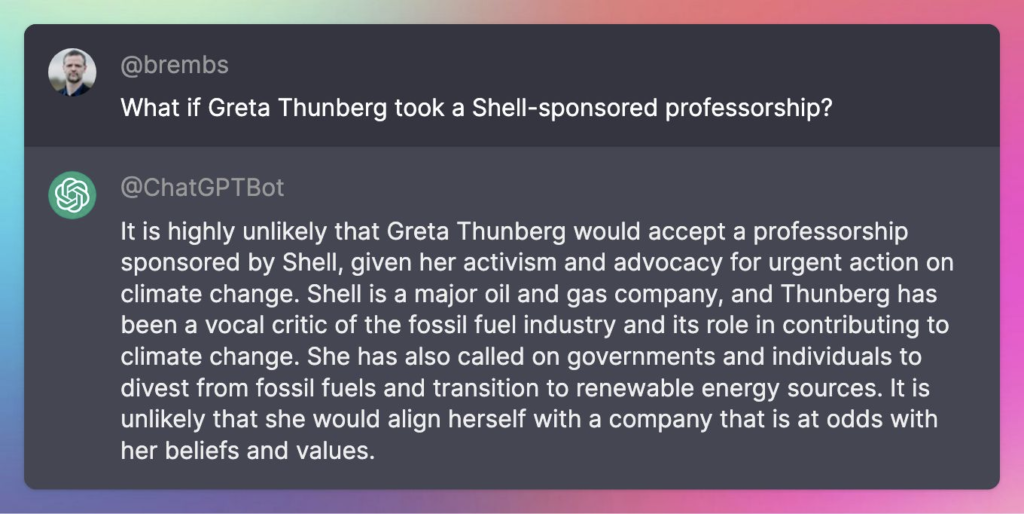Or let’s think a a few sizes smaller and imagine a renowned pulmonologist taking the, say, “Marlboro Endowed Chair” in the Mayo Clinic’s Pulmonary Medicine Division, sponsored by Philip Morris. What would they have to endure and how much credibility would they and the institutions lose? Undoubtedly, the foul stench of corruption and hypocrisy would be difficult to counter. Which is probably why such hypotheticals appear more like April Fools jokes than realistic possibilities. Who in their right mind would do such a thing?
And yet, in times when news and parody become increasingly difficult to discern, something comparable has happened in Germany. Two weeks ago, Heinz Pampel has announced that he is leaving his post as the “Open Science Officer & Assistant Head of Helmholtz Open Science Office” to take the position of an Elsevier-funded professorship with the Einstein Center for Digital Future at the Humboldt University Berlin. In his many years working towards Open Science, Dr. Pampel had gained visibility though his numerous scholarly articles on the topic, became a member of countless committees and working groups for various Open Science initiatives, received grant funding for Open Science projects and was a sought-after expert for interviews on Open Science.
(UPDATE, 25-11-23: Little did I know at the time of this writing that such a person actually existed before Pampel: Derek Yach headed the “Foundation for a Smoke-Free World” that had a single sponsor: Philip Morris. Like Pampel, Yach claimed the foundation were entirely independent, yet nobody believed him and nobody wanted to be associated with his foundation. He was ousted in 2021.)
Dr. Pampel’s new position had been announced in 2017 as “based on the existing cooperation between the Humboldt University Berlin and the Humboldt-Elsevier Advanced Data and Text Centre” (HEADT) and he is the second person to sit in this chair, succeeding Rebecca Frank. Was this supposed to be an April Fools joke just before Christmas?
What makes this already quite bizarre story even more concerning, is one of the initiatives Dr. Pampel is active in. A few weeks ago, he was lead author on an important document arising from one of the working groups of the German Alliance of Research Organizations. The document contained guidelines for all German research organizations and consortia (notably DEAL) on how to negotiate “transformative agreements” with academic publishers such as Elsevier. One new aspect in these guidelines that was not present in previous guidelines, was eagerly awaited: The section on how negotiators ought to handle the tracking technology that the publishers have been using for the last ten years to monetize the personal data of academic users. Last year had seen a bombshell publication from the main German funder (DFG), decrying the practice for threatening academic freedom (a constitutional right in Germany) among a list of other concerns. This publication triggered a wave of interest and of course broad condemnation of the publishers. Just a few days ago, the topic “science tracking” was also featured in the German newspaper FAZ.
One major goal for the Open Science movement is precisely to push back against the privatization of science as a public good. Tracking scientists in real time, their behavior and their momentary research interests seemed like a raised middle finger: “we can privatize you if we want and there is nothing you can do about it!”. So the question on everybody’s mind for the last year was how to get the corporations to stop tracking science? The expectations were high when the guidelines finally came out. However, early reactions from some experts can best be described as ‘underwhelmed’: the guidelines seemed relatively lax and non-committal, compared to the discussions and widespread condemnations the surveillance had received in the meetings leading up to this document and in the broader community. Renke Siems, who was one of the first to raise the alarm about the publishers’ surveillance practices in Germany, called the guidelines “helpless” and “inadequate“. Other comments from the community were even less generous. It raises some serious questions, when just a week later it becomes known that one of the lead authors had applied for an Elsevier-funded position while they were drafting the guidelines.
Dr. Pampel doesn’t have the global attention of a Greta Thunberg, of course. Nevertheless, it is fair to assume that he is probably at least as known and respected in the German Open Science Community as a renowned pulmonologist could be for German lung cancer research. He didn’t receive the lead author position on the Allianz guidelines for nothing. The volume of such contracts in Germany is about 200 million € per year, so this is not a document concerning peanuts, either.
In his work towards Open Science, Dr. Pampel always strove for reconciliation and was not known for openly attacking the publishers. So while Dr. Pampel’s position may have been to at least try and work with the corporations rather than against them, it never seemed in doubt that he was on Team Scholarship. The Team Scholarship that values the public good over profit, that values the needs of society and science over those of corporations. The fact that of all the corporations involved in academia, Dr. Pampel has decided to now side with the single one that like no other stands for investing billions of $/€ over decades to flagrantly and unapologetically oppose everything Team Scholarship strives for, just reeks of hypocrisy, even betrayal – no matter what he tries to say to defend his decision. One can easily imagine the glee of Elsevier about their latest acquisition. Whether and to what extent the Berlin Einstein-Center/Foundation is also funded by Elsevier, is currently subject to a freedom of information request.

//This post was originally published in German, on the blog of Jan Martin Wiarda.














Comments are closed.